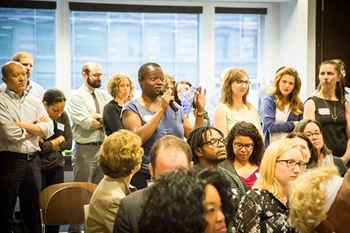
Tricia Scully
WBEZ South Side Bureau Reporter Natalie Moore spoke about her experiences both as a child and an adult on Chicago's South Side.
When WBEZ South Side Bureau Reporter Natalie Moore speaks of her childhood in the Chatham neighborhood of Chicago, she fondly describes tree-lined streets with pretty homes. She tells stories of black business owners who operated dental practices, grocery stores and dry cleaners. She also speaks of the “black tax.” According to Moore, “Public safety concerns and higher-priced goods equate to what’s dubbed a black homeowners’ segregation tax.”
In her new book, The South Side: A Portrait of Chicago and American Segregation, Moore digs into the policies and circumstances that created and maintain racial and income isolation in Chicago. She examines segregation through the lens of her own experiences growing up in Chicago and working as a journalist and reporter.

Tricia Scully
A sold-out crowd came to hear Natalie Moore and share their experiences with segregation in Chicago.
At Metropolitan Planning Council’s (MPC) Urban Think & Drink on Thursday, June 16, Moore sat down for a candid conversation about how living separately by race and class have damaging effects on home values, economic development and building wealth for people of color. More than 100 people turned out to hear what she had to say.
Moore recalls being in tears when her parents sold her childhood home to move to the integrated neighborhood of Beverly. But as an adult, Moore recognizes that it was ultimately a sound financial decision that ensured her family equity in their home.
This guarantee is not present in African-American communities, there are built in disadvantages regardless of income. Explaining disinvestment in predominantly African-American neighborhoods, Moore said, “Households with six figure incomes in majority black communities are often in food deserts.” Homes in African-American neighborhoods are valued less than in white neighborhoods, resulting in less equity and lower appraisals for African-American homeowners.
According to Moore, Emory University tax professor Dorothy Brown’s research shows that property values are lower in areas where the population is more than 10 percent African-American. At the same time, her assessment of the Obamas’ taxes concluded they paid higher taxes than their white financial peers, driving home the reality of the extra costs African-American households pay in many different respects.
Moore also spoke of her own experience as a first-time homebuyer in Bronzeville. “I felt like a middle class loser,” Moore said, describing her failure to make a better financial investment. But she is not alone. A recent MPC blog post explored the unique difficulties faced by middle class households of color.
Beyond widely applicable issues of class and homeownership, Moore attributed Bronzeville’s failure to launch as a revitalized community on a host of issues, including political patronage in the doling out of federal stimulus dollars and the single-minded focus of leadership on recreating a blues district. Moore criticized the fact that empowerment zone dollars were spent more on social services than on infrastructure and retail development.
Moore’s points illustrate some of the challenges MPC seeks to address in the Cost of Segregation study. This two-year study with the Urban Institute examines the price that the Chicago region pays for economic and racial isolation and pursues intervention through policy changes.
Despite her personal and professional chronicle of the stark differences in black and white communities, Moore remains hopeful, quipping, “I want it all.” To her, “all” includes increasing housing options for people to live in integrated communities, as well as strengthening historically African-American neighborhoods like Chatham and Bronzeville. Making significant changes requires addressing these issues as a city and as a region. Natalie Moore has started a conversation that we plan to continue.